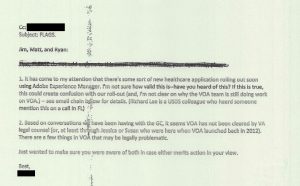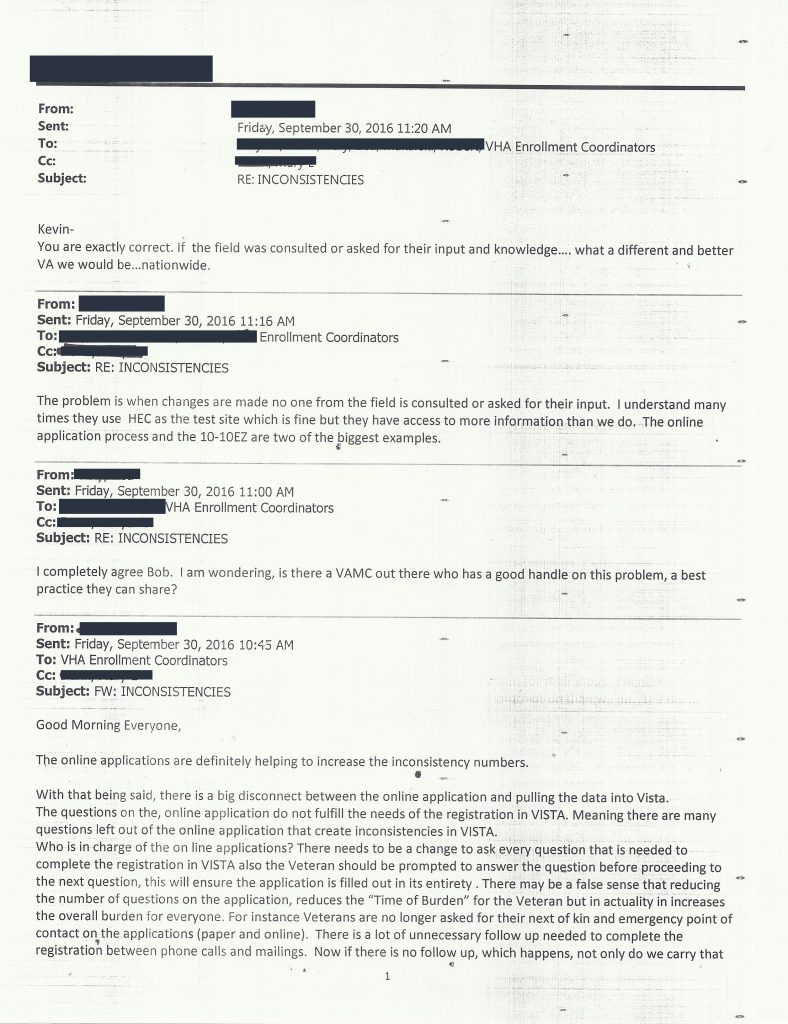
Editor’s Note: VHA on Nov. 21 retracted its statement that it had no knowledge of lost or locked records. This update has been reflected here.
Just weeks before senior officials at the Veterans Health Administration ordered the launch of a new Online Health Care Application through Vets.gov, a senior policy adviser at the White House warned VHA officials that the new app had not been cleared by agency lawyers because of legal and technical issues that, ultimately, affected veteran enrollment across the nation.
As first reported by MeriTalk, VHA officials on June 30 ordered the launch of the Online Health Care Application (HCA) on Vets.gov without notifying or training the vast majority of VA enrollment specialists around the country and despite serious technical problems that led to tens of thousands of applications being lost or locked.
Dozens of new emails provided to MeriTalk by an agency whistleblower show that White House officials, including a member of the U.S. Digital Service, raised questions about the planned launch of the enrollment app and warned officials about potential legal problems. Those new internal VHA emails also show that as of Nov. 4, as many as 65 percent of veteran health care applications remain locked or lost, a situation described by one official as having “DIRECT NEGATIVE IMPACT on the Veteran experience.”
The number of applications estimated to have been affected by problems with HCA stands at 30,000, according to an agency whistleblower. Technical issues forced VHA officials to turn off HCA and route the applications back to an application called “Forum” for processing. All applications submitted through Vets.gov are currently being routed to the respective VA Medical Center into a holding file as they were prior to the activation of Vets.gov. Employees are working overtime to process the backlog.
However, Michele Hammonds of the VHA Office of Media Operations and Plans, said in an email, “There is no policy that states Veterans should be automatically placed on an ineligible status if the applications are missing information. Veterans are only marked as ineligible when they do not meet the basic eligibility criteria of 24 months of continuous active duty service or with no other qualifying special eligibility criteria.”
In a June 10 email addressed to Matthew Eitutis, acting director of Member Services, and two other officials from the VHA Health Resource Center, a senior adviser from the White House Office of Science and Technology Policy acknowledged being caught by surprise by the planned rollout of the new version of the Veterans Online Application (VOA) and questioned why VHA was even working on the application.
“It has come to my attention that there’s some sort of new healthcare application rolling out soon…” the White House official wrote in the email labeled For Your Eyes Only. “I’m not sure how valid this is—have you heard of this?” the official asked, adding that word of the app came to the attention of the White House after a member of the U.S. Digital Service heard about it on a conference call.
“If this is true, this could create confusion with our roll-out (and I’m not clear on why the VOA team is still doing work on VOA),” the official wrote. “Based on conversations we have been having with the [general counsel], it seems VOA has not been cleared by VA legal counsel. There are a few things in VOA that may be legally problematic.”

Internal guidance documents also show that Eitutis instituted a program called the Veteran Enrollment Re-Work Plan (VERP) and directed employees to notify veterans that they are “ineligible” for VA care “due to lack of military service information” in their applications. VA employees began to complain that missing information was not a legal justification for marking a veteran ineligible. Whistleblowers argue it was an attempt to reduce the embarrassing backlog of pending applications and that it was done without notifying veterans of their appeal rights.
Whistleblowers argue that Eitutis “made a deliberate attempt to mislead VA senior officials,” who failed to notify the White House that the deployment was a failure before President Barack Obama delivered a speech at the Disabled American Veterans conference in August praising the system.
House Veteran Affairs Committee Chairman Rep. Jeff Miller, R-Fla., called the allegations “troubling” and told MeriTalk the committee is looking into them. “Right now, it’s incumbent upon VA leaders to ensure that every veteran’s health care application receives a fair and timely evaluation,” Miller said. “We will maintain pressure on the department until we are confident that is the case.”
Problems with the new online application, particularly lack of interoperability with the VA’s main electronic health record system, known as the Veteran Information Systems and Technology Architecture (VistA), continued as late as Sept. 30, emails show.
Hammonds said, “Member Services has no knowledge of records being locked or lost as a result of problems between VistA and the Enrollment System.”
But a Sept. 30 email sent by a an eligibility and enrollment supervisor to all VHA enrollment coordinators stated “there is a big disconnect between the online application and pulling the data into VistA.” According to the supervisor, the attempt to streamline the online application by removing questions created inconsistencies in the record when it was transmitted to VistA.
“There may be a false sense that reducing the number of questions on the application reduces the ‘time of burden’ for the veteran, but in actuality it increases the overall burden for everyone,” the supervisor wrote. “For instance, veterans are no longer asked for their next of kin and emergency point of contact on the application. Now if there is no followup, which happens, not only do we carry that inconsistency, but if the veteran is at the facility or becomes [a] patient and an emergency occurs, how does medical staff know who will be notified…then what?”
 Editor’s Note: This story has been updated to include responses from VHA.
Editor’s Note: This story has been updated to include responses from VHA.
